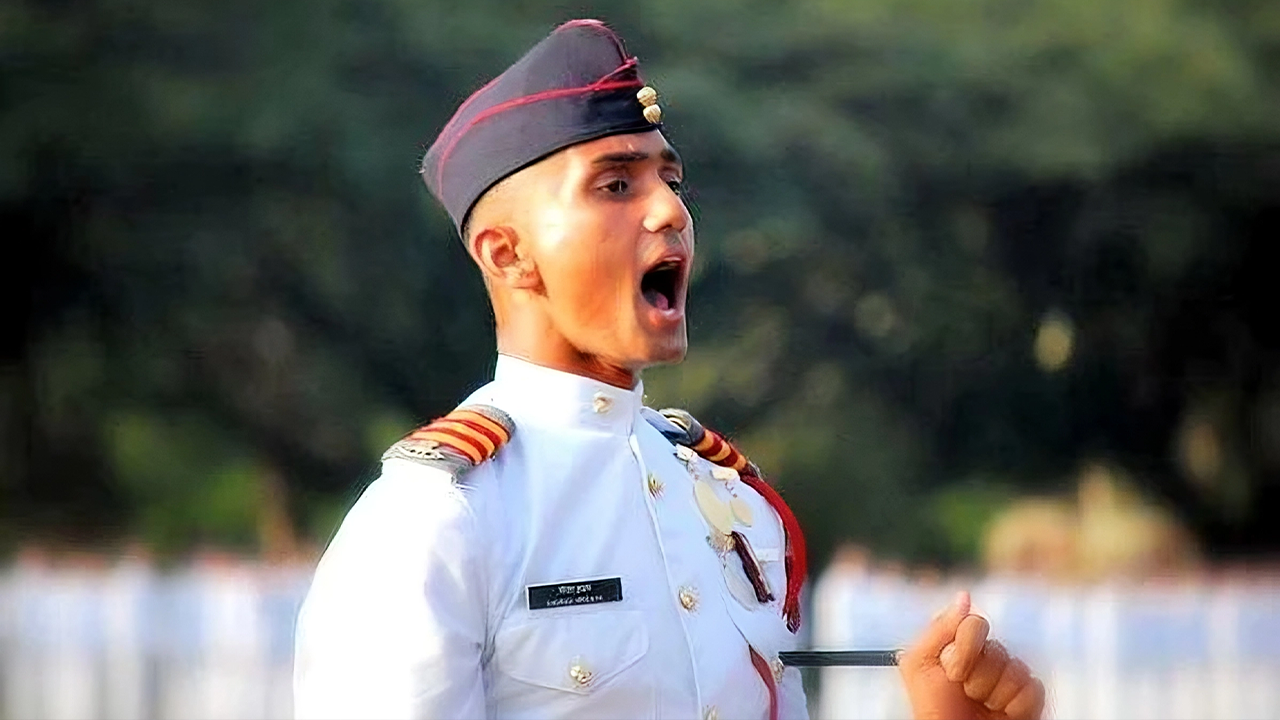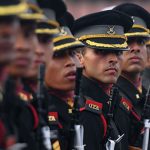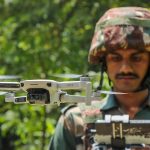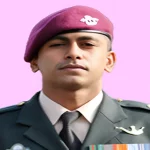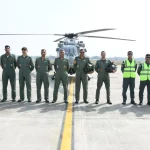The National Defence Academy (NDA) stands as a prestigious gateway for young aspirants dreaming of a career in the Indian Armed Forces. Joining the NDA has a profound impact on shaping future military leaders, offering a unique blend of academic rigor and military training. This esteemed institution not only molds cadets into skilled officers but also instills in them the values of discipline, courage, and patriotism.
For those wondering how to join NDA, the journey begins with understanding the NDA exam and eligibility criteria. This comprehensive guide will walk candidates through the entire process, from preparing for the NDA written test to acing the SSB interview.
It will also shed light on the physical fitness requirements, training at the academy, and the promising career prospects that await successful candidates. By following this step-by-step approach, aspiring defence officers can navigate their path to joining one of India’s most respected institutions.
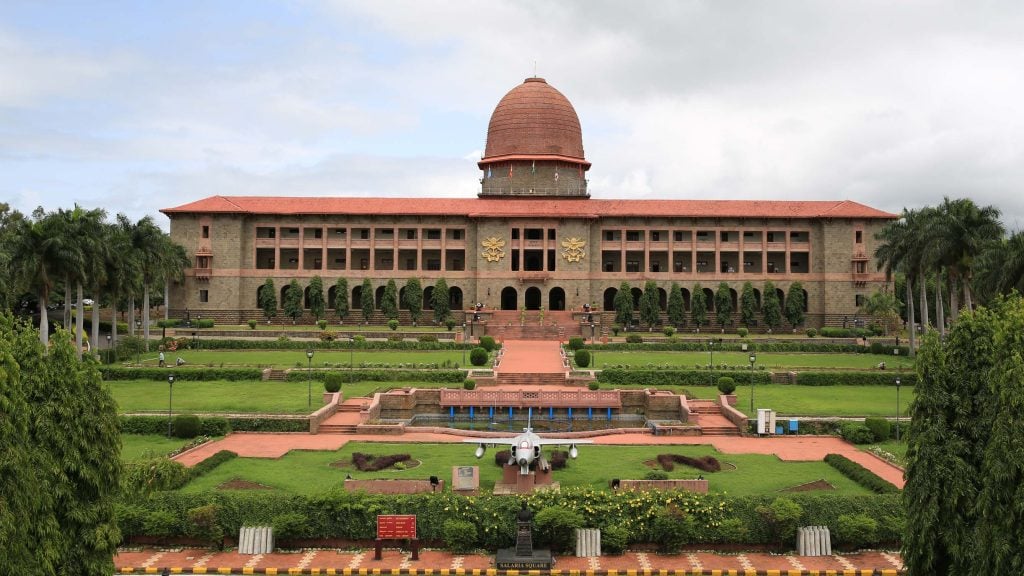
NDA Career Prospects
Joining the National Defence Academy (NDA) opens up a world of opportunities for aspiring officers in the Indian Armed Forces. The NDA provides a unique platform for young individuals to embark on a rewarding career in service of the nation. Candidates who successfully complete their training at the NDA have promising career prospects in the Army, Air Force, and Naval wings of the Indian military.
Army Wing
Officers who join the Army wing of the NDA have a structured career path ahead of them. They begin their journey as Lieutenants and can progress through various ranks based on their performance and years of service. The career progression in the Army wing typically follows this order: Lieutenant, Captain, Major, Lieutenant Colonel, Colonel, Brigadier, Major General, Lieutenant General, and ultimately, the prestigious position of Chief of Army Staff (COAS).
As Army officers advance in their careers, they have the chance to specialize in various fields such as engineering, logistics, and intelligence. This diversification allows them to develop expertise in specific areas while contributing to the overall strength of the Indian Army. The salary structure for Army officers is competitive, with the potential to earn up to INR 6,00,000 per month at the highest ranks.
Air Force Wing
The Air Force wing of the NDA offers exciting career prospects for those passionate about aviation and aerospace technology. Cadets who choose this path can become Flying Officers upon commissioning and progress through ranks such as Flight Lieutenant, Squadron Leader, Wing Commander, Group Captain, Air Commodore, Air Vice-Marshal, Air Marshal, and ultimately, Air Chief Marshal.
Air Force officers have the opportunity to become pilots, navigate advanced aircraft, or specialize in ground duties. The career in the Air Force is not limited to flying; officers can also contribute to areas like air traffic control, technical services, and administration. The salary structure for Air Force officers is similar to that of the Army, with various allowances and benefits tailored to their specific roles.
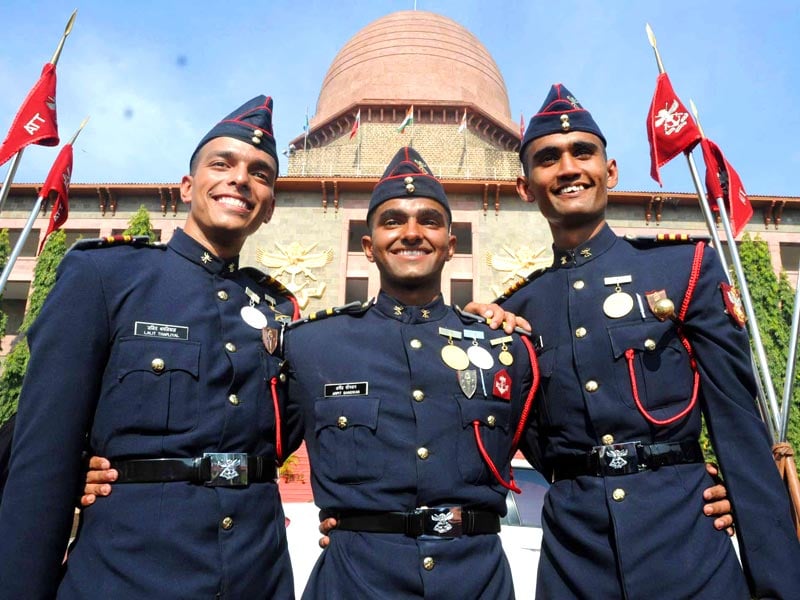
Naval Wing
The Naval wing of the NDA prepares officers for a career in the Indian Navy. Naval officers start their journey as Sub Lieutenants and can progress through ranks such as Lieutenant, Lieutenant Commander, Commander, Captain, Commodore, Rear Admiral, Vice Admiral, and Admiral. The Navy offers diverse career options, including surface warfare, submarine operations, naval aviation, and technical branches.
Naval officers have the unique opportunity to serve on various naval vessels, submarines, and aircraft carriers. They also play crucial roles in coastal defence, maritime security, and international naval exercises. The salary structure for Naval officers is competitive, with additional allowances for specialized duties such as submarine service or flying.
The NDA not only provides a stable and rewarding career but also offers opportunities for personal growth, leadership development, and the chance to serve the nation with pride and honor. As officers progress in their careers, they take on increasing responsibilities, lead teams, and contribute to the strategic planning and execution of military operations.
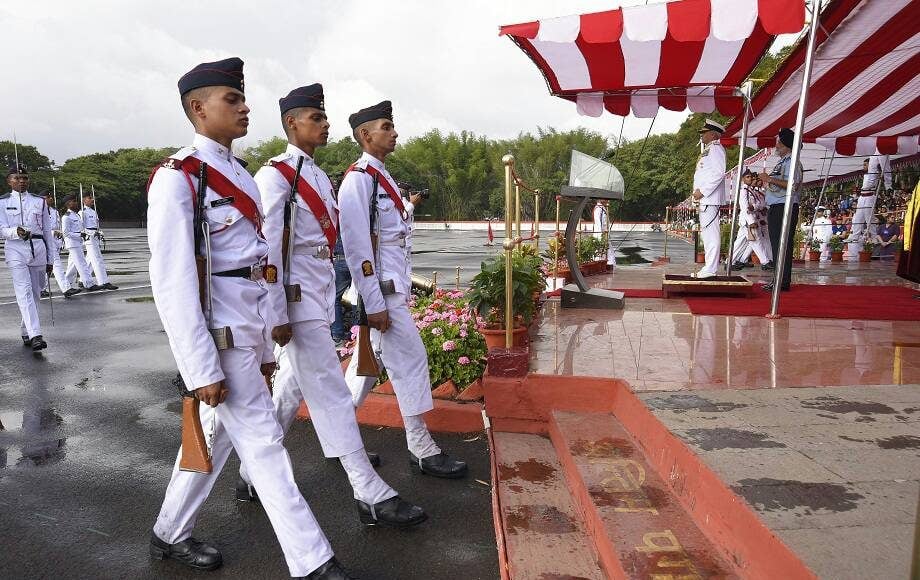
NDA Admission Process
The journey to join the National Defence Academy (NDA) begins with a comprehensive admission process. This process has been designed to select the most suitable candidates for a career in the Indian Armed Forces. Here’s a detailed look at the steps involved:
Application Procedure
To start the NDA admission process, candidates must fill out the application form available on the official website of the Union Public Service Commission (UPSC). The application process involves the following steps:
- Visit the UPSC website and complete the One-Time Registration (OTR) by providing personal and contact details.
- Log in using valid credentials such as Email ID and OTP/Password or Mobile number and OTP/Password.
- Fill out the NDA application form in two parts, including personal details, educational qualifications, and preferred exam center.
- Upload scanned documents, including a photograph, signature, and photo identity card.
- Pay the application fee. General/OBC candidates need to pay INR 100, while SC/ST candidates and sons of JCOs/NCOs/ORs are exempted from the fee.
- Review all the details furnished in the application form thoroughly and submit it.
- After submission, a registration number will be generated. Download it as a PDF file and take a printout for future reference.
Exam Pattern
The NDA exam consists of two stages: a written examination and a Services Selection Board (SSB) interview. The written exam has two papers:
- Mathematics (300 marks): This paper has 120 questions to be answered in 2.5 hours.
- General Ability Test (600 marks): This paper includes 150 questions on English and General Knowledge, to be completed in 2.5 hours.
Both papers are objective type (MCQs) and conducted in offline mode. The exam is held twice a year, typically in April and September.
Selection Stages
The NDA selection process involves multiple stages:
Here is a simple table based on the information provided:
| Process | Description |
|---|---|
| Written Examination | Candidates who pass the written exam with the required cut-off marks are called for the SSB interview. |
| SSB Interview | A five-day process divided into two stages: |
| Stage I | Includes Officer Intelligence Rating (OIR) tests and Picture Perception and Description Test (PPDT). |
| Stage II | Comprises Group Testing Officer (GTO) tasks, psychological tests, and personal interviews. |
| Medical Examination | Candidates who clear the SSB interview undergo a thorough medical check-up. |
| Merit List | A final merit list is prepared based on the combined performance in the written exam and SSB interview. |
Candidates who successfully clear all these stages are selected for training at the National Defence Academy, marking the beginning of their journey towards becoming officers in the Indian Armed Forces.
NDA Written Exam Preparation
To join the National Defence Academy, candidates must excel in the written exam. This crucial step requires a focused approach and thorough preparation. The NDA exam consists of two papers: Mathematics and General Ability Test (GAT).
Mathematics Topics
The Mathematics paper carries 300 marks and has a duration of 2.5 hours. It covers a wide range of topics, including:
• Algebra: Set theory, complex numbers, progressions, and logarithms • Matrices and Determinants: Operations, properties, and applications • Trigonometry: Angles, ratios, identities, and applications • Analytical Geometry: Coordinate systems, equations of lines and curves • Calculus: Differential and integral calculus, applications in maxima and minima • Vector Algebra: Operations, products, and geometric applications • Statistics and Probability: Data analysis, distributions, and probability concepts
To prepare effectively for the Mathematics section:
• Start with a thorough review of basic concepts • Practice solving problems regularly, focusing on accuracy and speed • Use previous years’ question papers to familiarize yourself with the exam pattern • Develop time management skills to complete all questions within the allotted time
General Ability Test Sections
The General Ability Test paper carries 600 marks and is divided into two parts: English and General Knowledge. This section assesses a candidate’s language proficiency and awareness of various subjects.
English (200 marks): • Vocabulary • Grammar and usage • Comprehension • Cohesion in extended text
General Knowledge (400 marks): • Physics • Chemistry • General Science • Social Studies • Geography • Current Events
To prepare for the GAT section:
• Read newspapers and magazines regularly to stay updated on current affairs • Focus on improving English language skills through reading and practice exercises • Review NCERT textbooks for science and social studies topics • Make short notes on important topics for quick revision • Practice answering objective-type questions to improve accuracy and speed
Effective preparation for the NDA written exam requires a balanced approach to both Mathematics and General Ability Test sections. Candidates should create a study schedule that allocates sufficient time to each subject. Regular practice, mock tests, and time management are key to success in the National Defence Academy exam.
Acing the SSB Interview
The Services Selection Board (SSB) interview is a crucial step in joining the National Defence Academy (NDA). This comprehensive assessment evaluates candidates’ potential as future officers in the Indian Armed Forces. To excel in this challenging process, aspirants must understand its structure and prepare thoroughly.
Day-wise Schedule
The SSB interview typically spans five to six days, with each day focusing on different aspects of a candidate’s abilities. Here’s a brief overview of the schedule:
Day 1: Candidates report to the selection center, complete document verification, and receive their chest numbers. They undergo verbal and non-verbal intelligence tests, followed by a picture perception test. Those who clear this initial screening proceed to the next stages.
Day 2: The day begins with the Thematic Appreciation Test (TAT), followed by the Word Association Test (WAT) and Situation Reaction Test. Candidates also complete a Self Description Test.
Day 3-4: These days involve Group Testing Officer (GTO) tasks, including group discussions, group planning exercises, progressive group tasks, individual and group obstacle courses, and command tasks.
Day 5: The personal interview takes place, which can last anywhere from 10 minutes to two hours. Candidates may choose to be interviewed in English or Hindi.
Officer-like Qualities
The SSB interview assesses candidates for specific Officer-Like Qualities (OLQs) that are essential for success in the armed forces. Some key OLQs include:
- Effective Intelligence: The ability to analyze complex situations and make sound decisions under pressure.
- Reasoning Ability: Demonstrating logical thinking and problem-solving skills.
- Organizing Ability: Efficiently managing time, resources, and tasks.
- Power of Expression: Communicating thoughts and ideas clearly and confidently.
- Social Adaptability: Working well with others and adapting to various social environments.
- Cooperation and Sense of Responsibility: Collaborating effectively and taking ownership of tasks.
- Initiative and Self-Confidence: Showing proactiveness and self-assurance without arrogance.
- Determination and Courage: Displaying resilience in the face of challenges and standing up for what is right.
Interview Tips
To ace the SSB interview for the National Defence Academy, consider these tips:
- Stay well-informed: Keep up with current affairs and have strong viewpoints on national and international issues.
- Practice communication skills: Improve your English fluency and practice speaking on various topics.
- Be authentic: Present yourself genuinely during the interview and group tasks.
- Maintain a positive attitude: Approach all activities with enthusiasm and a can-do spirit.
- Work on physical fitness: Stay in good shape to perform well in physical tasks.
- Dress appropriately: Choose suitable attire that reflects professionalism and attention to detail.
- Be a team player: Demonstrate your ability to work effectively in a group setting.
- Manage stress: Stay calm and composed throughout the process, especially during challenging tasks.
By understanding the SSB interview process and focusing on developing these qualities, aspiring candidates can improve their chances of success in joining the National Defence Academy and embarking on a rewarding career in the Indian Armed Forces.
Physical Fitness for NDA
Physical fitness is a crucial aspect of joining the National Defence Academy (NDA). Candidates aspiring to become officers in the Indian Armed Forces must meet specific physical standards to ensure they can handle the rigorous training and demanding duties of military service.
Height and Weight Standards
The NDA has established height and weight requirements for both male and female candidates. For male candidates, the minimum height required is 157 cm (approximately 5.15 feet), while female candidates must be at least 152 cm (about 4.98 feet) tall. However, for the flying branch, the minimum height requirement is 163 cm for both genders.
Certain relaxations are available for candidates from specific regions. For instance, Gorkhas and individuals from the hills of North-Eastern India, Garhwal, and Kumaon regions can be accepted with a minimum height of 152 cm for males and 148 cm for females.
Weight standards are proportionate to height and age. The NDA provides detailed height-weight charts for candidates to refer to. It’s essential for aspirants to maintain a healthy weight within the specified range to meet the physical fitness criteria.
Vision Requirements
The NDA has stringent vision standards that vary depending on the branch of the armed forces. For the Army, the minimum acceptable visual acuity is 6/6 in the better eye and 6/9 in the worse eye. Candidates must also have color vision of CP-III (Defective Safe).
For the Navy, uncorrected vision should be 6/6 in one eye and 6/9 in the other, correctable to 6/6 in both eyes. The Air Force has more stringent requirements, with a minimum distant vision of 6/6 in one eye and 6/9 in the other, correctable to 6/6 only for hypermetropia.
It’s important to note that candidates who habitually wear spectacles are not eligible for the Air Force. Additionally, there are specific limits for myopia, hypermetropia, and astigmatism for each branch.
Medical Tests
The NDA conducts comprehensive medical tests to ensure candidates are fit for service. These tests include:
- Chest measurements: A well-developed chest is vital, with a minimum of 81 cm when fully inflated and a range of expansion of at least 5 cm.
- Cardiovascular health: Blood pressure should be normal, with no signs of heart or blood vessel diseases.
- Hearing and speech: Candidates must have normal hearing and no speech impediments.
- Bone and joint health: Joints and bones should be in proper working condition.
- Abdominal examination: An ultrasound (USG) of the abdomen is conducted to check for any abnormalities.
- Dental health: Candidates must have a sufficient number of healthy, natural teeth.
- Skin conditions: There should be no significant skin disorders.
- Urine analysis: Tests are conducted to ensure there are no abnormalities in the urine.
Candidates are advised to address any minor ailments or defects before appearing for the medical examination. Common issues that should be rectified include deviated nasal septum, tonsillitis, varicocele, and being overweight or underweight.
To prepare for the NDA physical test, candidates should focus on overall fitness. This includes regular running (aiming to cover 2.5 kilometers in 17-18 minutes), skipping, push-ups, sit-ups, and chin-ups. Functional training exercises like burpees and jumping jacks can help improve stamina and endurance.
By meeting these physical fitness requirements, candidates can increase their chances of successfully joining the National Defence Academy and embarking on a rewarding career in the Indian Armed Forces.
Training at NDA
The National Defence Academy (NDA) provides a comprehensive three-year training program that transforms young cadets into future military leaders. This rigorous curriculum combines academic education, military training, and character development to prepare cadets for their roles in the Indian Armed Forces.
Academic Curriculum
The NDA’s academic program is designed to give cadets a strong educational foundation. Cadets can choose between two streams of study: Science and Humanities (Liberal Arts). The Science stream focuses on physics, chemistry, mathematics, and computer science, while the Humanities stream covers history, economics, political science, geography, and languages.
The academic curriculum is divided into three categories:
- Compulsory Course: All cadets study English, foreign languages (Arabic, Chinese, French, or Russian), and basic classes in various subjects.
- Foundation Course: This mandatory course includes Military Studies and General Studies. Military Studies covers topics such as military history, geography, and weapons systems. General Studies encompasses subjects like geopolitics, human rights, and environmental sciences.
- Optional Course: During the fifth and sixth semesters, cadets take courses specific to their chosen service branch.
Cadets graduate with a Bachelor’s degree from Jawaharlal Nehru University or the University of Delhi, depending on their chosen stream.
Military Training
Military training at the NDA is designed to develop cadets’ physical fitness, tactical skills, and leadership abilities. The program includes:
- Physical Training: Cadets undergo rigorous physical conditioning, including daily exercises, long-distance runs, and obstacle courses.
- Weapons Training: Cadets learn to handle various weapons and practice marksmanship.
- Field Craft: Training in map reading, navigation, and survival skills prepares cadets for field operations.
- Tactical Exercises: Simulated combat scenarios help cadets apply their knowledge in practical situations.
- Service-Specific Training: In later terms, cadets receive specialized training based on their chosen branch (Army, Navy, or Air Force).
The NDA conducts several camps throughout the training period, including Camp Green Horn, Camp Rover, and Camp Torna. These camps provide opportunities for cadets to demonstrate their leadership qualities in simulated field conditions.
Character Development
The NDA places great emphasis on character development, aiming to instill values such as integrity, discipline, and patriotism in its cadets. This aspect of training includes:
- Leadership Training: Cadets are given opportunities to lead teams and make decisions in various scenarios.
- Extracurricular Activities: Participation in sports, clubs, and cultural events helps develop well-rounded personalities.
- Honor Code: Cadets live by a strict honor code that guides their behavior and decision-making.
- Social Adaptability: Training in etiquette and social skills prepares cadets for their roles as officers.
- Team Building: Group activities and exercises foster camaraderie and teamwork among cadets.
The NDA’s training program is designed to produce officers who are not only physically fit and tactically proficient but also possess strong leadership skills and unwavering character. This holistic approach ensures that graduates are well-prepared to take on the challenges of serving in the Indian Armed Forces.
Joining the National Defence Academy is a journey that demands dedication, perseverance, and a strong sense of patriotism. From acing the written exam to conquering the SSB interview and meeting rigorous physical standards, each step plays a crucial role in shaping future military leaders. The comprehensive training at NDA has a significant impact on cadets, molding them into well-rounded officers ready to serve the nation with pride and honor.
For those aspiring to embark on this rewarding path, thorough preparation is key to success. To enhance your chances of cracking the NDA exam, consider joining SSBCrackExams’s NDA Online Course for comprehensive exam preparation. Remember, the road to becoming an officer in the Indian Armed Forces is challenging but immensely fulfilling, offering a unique opportunity to contribute to national security while developing invaluable skills and character traits that will serve you throughout your life.
What are the necessary steps to become a cadet of the National Defence Academy (NDA)?
To become a member of the NDA, aspirants need to pass the NDA examination organized by the Union Public Service Commission (UPSC) twice annually. The selection involves a written exam followed by an SSB (Services Selection Board) interview.
What is the admission process for the National Defence Academy?
Admission to the NDA is a two-part process that includes a written exam and an SSB interview. Candidates must first pass the written examination conducted by the UPSC to be eligible for the SSB interview.
What strategies should I adopt to prepare for the NDA exams?
Effective preparation for the NDA exams can be achieved by thoroughly understanding the syllabus and exam pattern, clarifying fundamental concepts, selecting the best study materials, practicing with mock tests and previous year’s question papers, regularly reading newspapers and magazines, managing time efficiently, and consistent revision.
Can I join the NDA after completing the 10th grade?
To apply for the Air Force and Naval wings of the NDA, as well as the 10+2 Cadet Entry Scheme at the Indian Naval Academy (INA), candidates must have completed or be appearing in their Class 12 or equivalent examination with Physics, Chemistry, and Mathematics.

